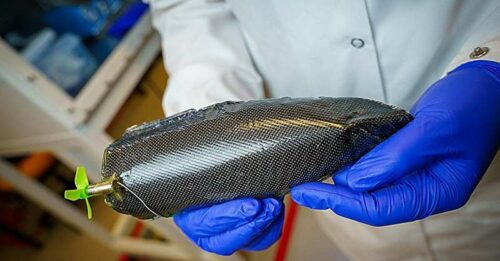[ad_1]
- Structural supercapacitors that combine strength with energy retention.
- Aim to match the energy density of traditional batteries and optimize power output.

Imagine a smartphone encased in a shell that protects it and serves as an energy storage hub. Or an electric vehicle with doors and floorboards acting as power reservoirs to drive it. These futuristic concepts could soon come to life due to the work of engineers at the University of California San Diego.
The team has crafted a structural supercapacitor. This device blends the dual functions of providing mechanical strength and storing energy. As a result, electronics and vehicles could benefit from extended power without the burden of additional weight, ensuring prolonged usage between charges. Structural supercapacitors aren’t new, but balancing mechanical strength with energy storage has been challenging. Traditional supercapacitors excel in energy storage but lack structural sturdiness, while solid materials typically falter in energy retention.
Designing Aspects of New Structural Supercapacitor
The researchers constructed a small solar-powered boat using the structural supercapacitor. It is shaped to become the boat’s hull with a tiny motor and circuit attached. This circuit was then linked to a solar cell. When the cell captured sunlight, it charged the supercapacitor, which powered the motor. In practical tests, the boat successfully navigated the water, showcasing the effectiveness of this novel energy storage approach.
The device combines standard supercapacitor components: electrodes separated by an electrolyte for ion movement. Its standout feature is the material mix, boosting mechanical strength and electrochemical performance. The electrodes, made from woven carbon fibres, are durable and coated with a conductive polymer and graphene oxide blend for enhanced ion flow. The solid electrolyte mixes epoxy resin for structure and polyethylene oxide to promote ion mobility through its porous structure.
Role of Polyethylene Oxide
A notable design aspect of this component is the varying concentration of polyethylene oxide across the electrolyte, resulting in concentration gradients. Zones close to the electrodes have a denser presence of polyethylene oxide. This specific arrangement accelerates the ion flow at the intersection of the electrode and electrolyte, optimizing the electrochemical activity. An increased concentration of polyethylene oxide leads to a higher porosity, which can compromise the material’s strength. To find the proper equilibrium, the core area of the electrolyte is designed with a reduced concentration of polyethylene oxide. This ensures the material retains its structural integrity while facilitating a streamlined ion flow.
The researchers say the gradient design boosts the electrolyte’s performance. They engineered it so the edges have better electrical properties, while the center is more mechanically robust. This advancement improves structural energy storage, but there’s still room for progress. Supercapacitors provide quick energy surges but lower energy density than regular batteries. Their upcoming endeavours will focus on improving the supercapacitor’s energy density, with the goal of equating it with specific battery packs. Their ultimate objective is to optimize both the energy and power densities concurrently.
[ad_2]
Source link

